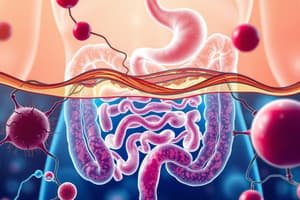Podcast
Questions and Answers
Which digestive organ primarily introduces gastric juices and mixes food through peristalsis?
Which digestive organ primarily introduces gastric juices and mixes food through peristalsis?
- Mouth
- Stomach (correct)
- Small intestine
- Esophagus
In the digestive system, what is the main function of the esophagus?
In the digestive system, what is the main function of the esophagus?
- To connect the mouth to the stomach. (correct)
- To temporarily store food before digestion.
- To absorb nutrients into the bloodstream.
- To produce digestive enzymes for breaking down food.
Which of the following best describes the function of saliva released in the mouth during digestion?
Which of the following best describes the function of saliva released in the mouth during digestion?
- Lubricating food for easier swallowing.
- Aiding in mechanical digestion through teeth.
- Initiating chemical digestion with enzymes like amylase. (correct)
- Absorbing nutrients directly into the bloodstream.
What is the role of peristalsis in the esophagus?
What is the role of peristalsis in the esophagus?
Which of the following processes is an example of mechanical digestion?
Which of the following processes is an example of mechanical digestion?
How many types of nutrients are there as described in the text?
How many types of nutrients are there as described in the text?
If a food is described as being high in starches which type of nutrient would it primarily provide?
If a food is described as being high in starches which type of nutrient would it primarily provide?
What is the primary role of carbohydrates in the body?
What is the primary role of carbohydrates in the body?
Which enzyme is responsible for breaking down proteins into smaller peptides?
Which enzyme is responsible for breaking down proteins into smaller peptides?
If someone has difficulty digesting fats, which enzyme might they be deficient in?
If someone has difficulty digesting fats, which enzyme might they be deficient in?
What role do enzymes play in chemical reactions like digestion?
What role do enzymes play in chemical reactions like digestion?
Which function of the digestive system involves the absorption of water and nutrients?
Which function of the digestive system involves the absorption of water and nutrients?
What is the initial step in the digestive process called?
What is the initial step in the digestive process called?
What is the function of amylase?
What is the function of amylase?
What does the term 'calorie' refer to in the context of food and nutrition?
What does the term 'calorie' refer to in the context of food and nutrition?
According to the information, what is the final step in the digestive system?
According to the information, what is the final step in the digestive system?
Which nutrient is described as a large molecule made of amino acids?
Which nutrient is described as a large molecule made of amino acids?
Which of the following foods is primarily a source of proteins?
Which of the following foods is primarily a source of proteins?
What is the purpose of digestion in the human body?
What is the purpose of digestion in the human body?
In what part of the digestive tract does the process of mechanical and chemical digestion begin?
In what part of the digestive tract does the process of mechanical and chemical digestion begin?
Flashcards
Mouth
Mouth
Part of the digestive tract; uses teeth and tongue to mechanically digest food
Esophagus
Esophagus
Muscular tube connecting the mouth to the stomach
Stomach
Stomach
Temporarily stores food, secretes gastric juices, and mixes food through peristalsis
Small Intestine
Small Intestine
Signup and view all the flashcards
Calorie
Calorie
Signup and view all the flashcards
Nutrients
Nutrients
Signup and view all the flashcards
Proteins
Proteins
Signup and view all the flashcards
Carbohydrates
Carbohydrates
Signup and view all the flashcards
Enzymes
Enzymes
Signup and view all the flashcards
Amylase
Amylase
Signup and view all the flashcards
Pepsin
Pepsin
Signup and view all the flashcards
Lipase
Lipase
Signup and view all the flashcards
Ingestion
Ingestion
Signup and view all the flashcards
Digestion
Digestion
Signup and view all the flashcards
Absorption
Absorption
Signup and view all the flashcards
Elimination
Elimination
Signup and view all the flashcards
Study Notes
- These are notes on the digestive system, enzymes, nutrients, and their functions
Digestive Tract
- Mouth: teeth and tongue chew food (mechanical digestion)
- Saliva is released from salivary glands for chemical digestion and contains amylase
- Esophagus: a muscular tube that connects the mouth to the stomach
- Peristalsis: contractions that move the food to the rest of the digestive tract
- Stomach: temporarily stores food
- It produces gastric juices and churns/ mixes food through peristalsis
- The stomach's walls produce strong acid to kill germs
Small Intestine
- Performs chemical digestion
- Absorbs nutrients and water into the blood
- Has tiny, finger-like projections called 'villi'
Nutrients
- Nutrients are substances that provide us with energy for development and repair
- Food provides us with energy and nutrients for survival.
- A calorie is the amount of energy needed to raise the temperature of 1 kg of water by 1°C
- Calories indicate how much energy is in food.
Proteins
- Protein is a large molecule made of amino acids.
- Foods rich in protein: eggs, steak, fish, chicken, peanuts, beans
Carbohydrates
- Carbohydrates are a main source of energy.
- Three types:
- Fibers, sugars and starches
- Foods rich in carbohydrates: potato, bread, hammer, grapes
Enzymes
- Enzymes help with chemical digestion
- They speed up chemical reactions like digestion
- 3 Enzymes are:
- Amylase which breaks down carbohydrates
- Pepsin which breaks down proteins
- Lipase which breaks down lipids (fats)
Functions of the Digestive System
- Ingestion: putting food in the mouth
- Digestion: Break food into smaller pieces
- Mechanical digestion is when food is physically broken down (chewing).
- Chemical digestion is when chemical reactions break down food.
- Absorption: Absorb water and nutrients
- Elimination: Getting rid of waste
Studying That Suits You
Use AI to generate personalized quizzes and flashcards to suit your learning preferences.




